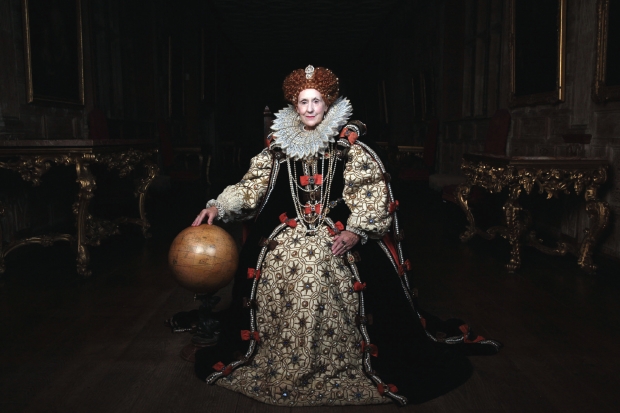Any readers of the Sun who excitedly tuned in to Howards End on Sunday night with their pause button at the ready will, I fear, have been in for a disappointment. Before the programme went out, the paper had assured them that this new BBC1 adaptation would ‘do a Poldark’, with ‘a hot cast’ providing ‘a sexed-up remake’ of the 1992 Merchant Ivory film. (The sub-editors may have missed a trick by not headlining the piece, ‘It’s E.M. Phwoar-ster!’) In the event, what they got was a quietly thoughtful exploration of Edwardian intellectual life.
The first episode, in fact, didn’t differ very much from the non-sexed-up film version — and when it did, it was generally by being even more faithful to the book. Large sections of the dialogue were lifted so directly from Forster that for much of the time anybody equipped with a paperback could have followed the score the way Tibby did with that of Beethoven’s Fifth in the characteristically unhurried concert scene.
Early on, Helen Schlegel (Philippa Coulthard) did have a brief middle-distance kiss with Paul Wilcox — but, rather than asking for any juicy details, her sister Margaret (Hayley Atwell) preferred to examine the more philosophical implications of what had happened. ‘Do you think personal relationships lead to sloppiness in the end?’ she inquired without a hint of double entendre. ‘That’s what I felt,’ Helen regretfully replied. Not that Margaret is wholly lacking in sexual feelings herself. At one point she noted that Leonard Bast was ‘very good-looking’ — even though ‘he said the most ordinary things imaginable about Faust and Tosca’.
Oddly, though, the programme’s failure to do a Poldark doesn’t mean that it’s a complete write-off. In Atwell and Coulthard’s hands, Margaret and Helen’s abiding earnestness is never off-putting. Instead, it becomes another part of their considerable appeal as they boldly go where few women have gone before. The Wilcoxes, led by Matthew Macfadyen’s Henry, have just the right touch of faintly sinister geniality amid their gruff certainties about how the world works.
Above all, there’s Kenneth Lonergan’s script. On the face of it, a Hollywood screenwriter best known for Gangs of New York and Manchester by the Sea isn’t an obvious choice of Forster adapter. Yet by placing his faith so thoroughly in the original material, Lonergan not only makes Forster’s themes much clearer than they were in the film, but also reminds us of their continuing, even increasing, resonance.
Most obviously, it’s hard not to see the Schlegel sisters as early members of the liberal metropolitan elite. Unlike many of today’s, however, they’re the kind of proper self-doubting liberals who enjoy the thrill of heresy that comes when other people disagree with them. (As Robert Frost pointed out, a true liberal is someone who doesn’t take their own side in an argument.) Reporting wonderingly on Mr Wilcox’s weird opposition to Bloomsbury values, Helen wrote to Margaret that ‘In five minutes, he took up everything we had been raised to believe in and ripped it entirely to shreds. It was lovely.’ For her part, Margaret decided that the Wilcoxes were ‘a breath of fresh air. Sometimes I feel we are swathed in cant, and it’s good for us to be stripped of it… I do sometimes think the real world has been marching past us for some time now.’
Forster famously hoped that the worlds of the Schlegels and the Wilcoxes would ‘only connect’. Speaking as a proud wishy-washy type myself, more than a century later — what with you-know-what in Britain and you-know-who in America — this connection now seems more desirable, if perhaps less likely, than ever.
And talking of wishy-washy, after the first couple of episodes, I still can’t quite decide about Motherland (BBC2, Tuesday) — although in my defence I don’t think it can quite decide about itself either.
In theory, this should be a sitcom masterpiece. The cast is led by Anna Maxwell Martin and Diane Morgan. The four writers include the pretty much godlike geniuses of Sharon Horgan (Catastrophe, Pulling) and Graham Linehan (Father Ted, The IT Crowd). The subject is the ever-fertile ground of competitive/guilt-laden middle-class parenting as seen at a London primary school. And yet, while the result has plenty of good moments, it’s by no means as overwhelmingly great as all that would lead you to expect.
The main problem is that Motherland feels like comedy created by committee — and in this case a committee that’s not sure what sort of comedy it wants to create: closely observed realism (‘Isn’t it funny that…?’) or something broader and more fantastical (‘Wouldn’t it be funny if…?’). In my experience of middle-class parenting, sticking with the first of these would be by far the best way of ensuring hilarity — but the compromise here is to shuttle rather awkwardly between them.






Comments